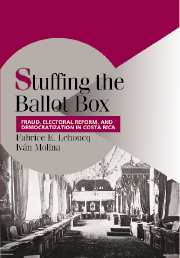Book contents
- Frontmatter
- Contents
- List of Tables and Figures
- Preface
- INTRODUCTION
- 1 ELECTORAL FRAUD DURING INDIRECT AND PUBLIC ELECTIONS, 1901–12
- 2 INSTITUTIONAL CHANGE, ELECTORAL CYCLES, AND PARTISANSHIP, 1910–4
- 3 ELECTORAL FRAUD DURING THE PUBLIC BALLOT,1913–23
- 4 INSTITUTIONAL CHANGE, ELECTORAL CYCLES, AND PARTISANSHIP, 1924–8
- 5 ELECTORAL FRAUD DURING THE SECRET BALLOT, 1925–48
- 6 POLITICAL POLARIZATION, ELECTORAL REFORM, AND CIVIL WAR, 1946–9
- CONCLUSION: BALLOT-RIGGING AND ELECTORAL REFORM IN COMPARATIVE PERSPECTIVE
- Index
- Cambridge Cultural Social Studies
6 - POLITICAL POLARIZATION, ELECTORAL REFORM, AND CIVIL WAR, 1946–9
Published online by Cambridge University Press: 16 July 2009
- Frontmatter
- Contents
- List of Tables and Figures
- Preface
- INTRODUCTION
- 1 ELECTORAL FRAUD DURING INDIRECT AND PUBLIC ELECTIONS, 1901–12
- 2 INSTITUTIONAL CHANGE, ELECTORAL CYCLES, AND PARTISANSHIP, 1910–4
- 3 ELECTORAL FRAUD DURING THE PUBLIC BALLOT,1913–23
- 4 INSTITUTIONAL CHANGE, ELECTORAL CYCLES, AND PARTISANSHIP, 1924–8
- 5 ELECTORAL FRAUD DURING THE SECRET BALLOT, 1925–48
- 6 POLITICAL POLARIZATION, ELECTORAL REFORM, AND CIVIL WAR, 1946–9
- CONCLUSION: BALLOT-RIGGING AND ELECTORAL REFORM IN COMPARATIVE PERSPECTIVE
- Index
- Cambridge Cultural Social Studies
Summary
Introduction
Amid charges of fraud, the Victory Bloc won the 1944 elections. To the opposition, Teodoro Picado's election to the presidency was an imposition orchestrated from the heights of power. To progovernment forces, Picado's victory was the product of a well-organized campaign that had successfully won the support of an electoral majority. The immediate consequence of an ambiguous election was to foment the development of both proand antigovernment hardliners. PRN and PVP sectors began to organize efforts to retain control, whatever the price, of state power. The opposition fragmented as parties excluded from the political arena began to plot the government's overthrow.
As the mid-1920s, circumstances did not bode well for electoral reform. Indeed, the political crisis was much worse: Though opposition forces questioned the legitimacy of the government in both periods, only the 1940s witnessed the development of an opposition faction dedicated to overthrowing the government through the use of force. Furthermore, unlike President Ricardo Jiménez, Picado could not count upon the PRN or the PVP's undivided support. Most PRN deputies remained loyal to calderonista faction of the party (henceforth cited as PRNc).
Despite these constraints, theory suggests that reformers held several advantages. First, opposition deputies would be favorably disposed toward reform. In line with office-seeking perspectives, they had an interest in change that promised to redistribute state power from pro- to antigovernment forces. Second, the constitutional prohibition against running for consecutive reelection encouraged the president to think about his long-term career prospects.
- Type
- Chapter
- Information
- Stuffing the Ballot BoxFraud, Electoral Reform, and Democratization in Costa Rica, pp. 195 - 227Publisher: Cambridge University PressPrint publication year: 2002



